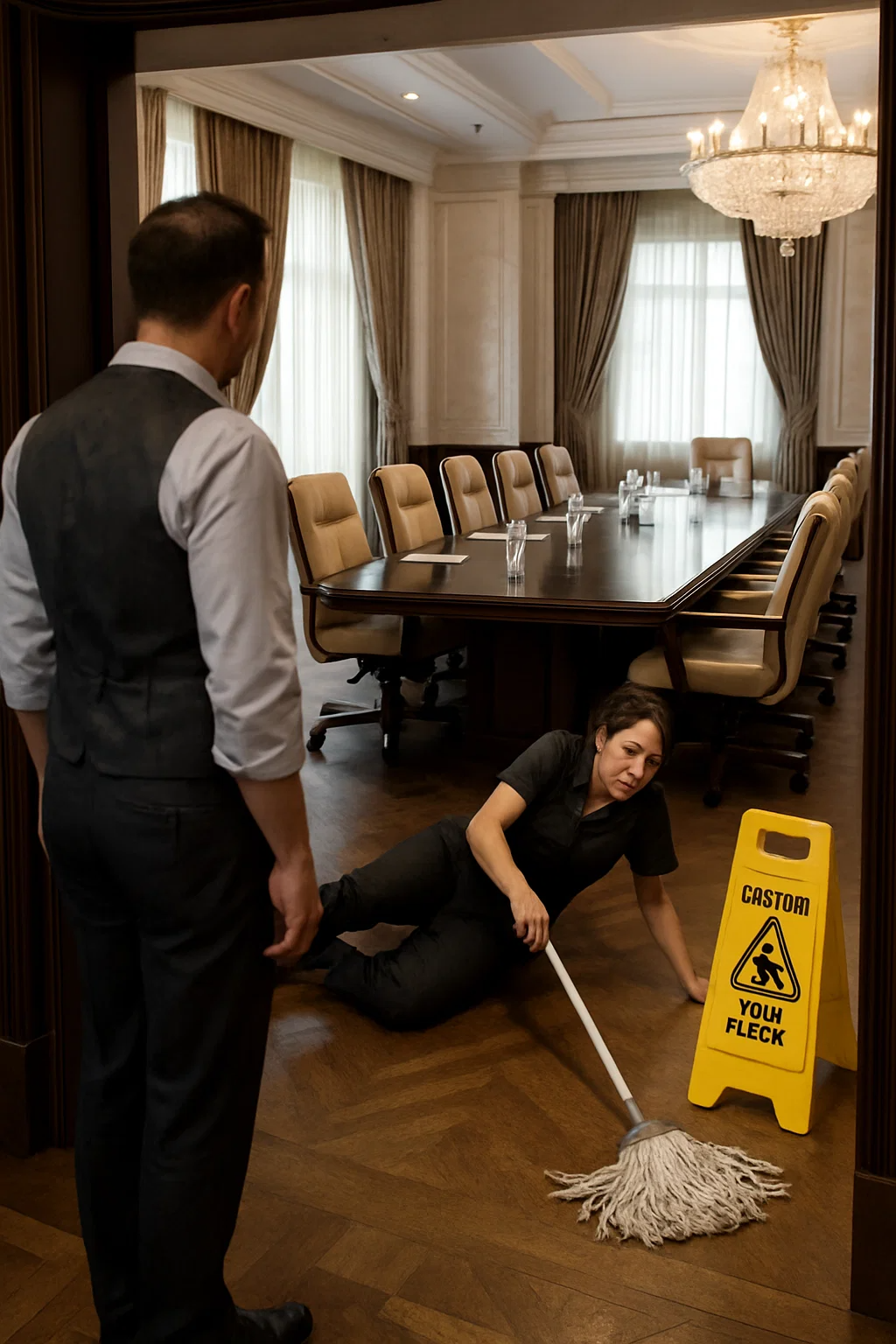I Spent Eight Years Cleaning His Office… He Never Knew I Was the Mother of the Son He Walked Away From in High School
“Sometimes the dirt you sweep aside is the same burden you swallow just to keep living. And silence becomes the only inheritance a child receives when the world never knew they existed.”
My name is Lucia. This is the story of how I spent years scrubbing the office of a man who had no idea that his greatest mistake carried both a name and a gravestone.
The child I carried
I was seventeen when I learned I was pregnant. It was my final year of high school in Enugu. My only dream was to graduate and imagine a brighter tomorrow.
He was my deskmate: Daniel Carter. Charming, clever, the son of a wealthy family. I was just the shoemaker’s daughter, my mother sold bananas at the roadside. I barely had the courage to meet his eyes.
The day I told him, he went pale.
“Are you sure?” he whispered.
“I haven’t been with anyone else, Daniel. The baby is yours.”
He never spoke to me again. Within a week, word spread that his parents had sent him abroad to study in the U.K.

The rejection
One morning, my mother discovered a medical letter hidden in my schoolbag.
“You want to disgrace this family? Go find the father!” she shouted.
“Mom, please… I have nowhere else to go.”
“Then leave. We have no room for sinners here.”
That night, I was alone—pregnant, terrified. I slept in half-built houses, washed clothes for strangers, sold oranges in the market to survive.
When the time came, I gave birth beneath a mango tree, helped by a local midwife, Mrs. Evelyn.
“Hold on, child, you’re almost there,” she said, wiping sweat from my brow.
A quiet baby boy entered the world as my fists clenched air.
“What will you call him?” she asked.
“Ethan,” I whispered. “Because what God has written, no one can erase.”
Questions without answers
Ethan and I survived together—on borrowed mattresses, through cold nights, with empty stomachs. When he turned six, he asked me:
“Mom, where is my dad?”
“He traveled far,” I told him. “One day he’ll return.”
“Then why doesn’t he call?”
“Maybe… he lost his way.”
But he never did.
At nine, Ethan fell dangerously ill. Fever, coughing, weakness.
“The operation is simple,” the doctor said. “But it costs sixty thousand naira.”
I had nothing. I begged, borrowed, sold my wedding ring and my radio. It wasn’t enough.
I buried my son alone, wrapped in a faded blue blanket, a torn photo of his father tucked beside him.
“Forgive me, Ethan,” I whispered. “I didn’t know how to save you.”
Crossing paths again
Years later, I moved to Lagos in search of a new beginning. I found work as a cleaner at G4 Holdings, a tech firm on Victoria Island.
“Uniform is brown, night shift,” my supervisor said. “Don’t talk to the executives. Just clean.”
On the seventh floor, behind golden door handles and plush carpet, I found his office.
“Mr. Daniel Carter, Managing Director,” the nameplate read.
My knees buckled.
“It can’t be…” I murmured.
Daniel looked different—broader, suited, perfumed in imported cologne. But his eyes were unchanged: cold, proud, as though the world still owed him.
Night after night, I polished his desk, stacked his papers, emptied his trash.
He never once recognized me.
The cruel memory
One afternoon, while tidying his desk, my badge slipped to the floor.
“Lucia,” he read aloud. “That name rings a bell. Did you live in Enugu?”
I forced a smile. “No, sir.”
He shrugged, turned back to his laptop, and I became invisible again.
That same evening, I overheard him in the conference room, laughing with colleagues.
“I once knocked up a girl in high school,” he bragged. “She swore it was mine. But you know how poor girls are—they’ll say anything.”
Laughter erupted.
I dropped my mop, fled to the restroom, and sobbed until my chest ached.
“Why me, Lord? Why always me?”
That night, I wrote a letter with trembling hands:
“You may have forgotten me, but I never forgot you—not while I held our son as he gasped for breath. You abandoned him, yet every day I cleaned up your mess. Then, and now.”
I placed it beneath his coffee mug and requested a transfer the next morning.
The sister’s knock
Two weeks later, a woman appeared at my door. Graceful, dressed in white. Her features echoed Daniel’s, but softer.
“Are you Lucia?” she asked.
“Yes.”
“I’m his sister.”
My breath caught.
“He wept when he read your letter,” she said gently. “He didn’t know. Our parents hid everything. He thought you’d ended the pregnancy.”
“No,” I whispered. “Ethan lived nine years. And died waiting for his father.”
Tears filled her eyes.
“Daniel went to the cemetery. He found his grave. He wants to see you—not for forgiveness, but to make things right.”
At Ethan’s grave
We met under the same mango tree where I had buried my son.
Daniel approached slowly, shoulders bent.
“Lucia…” he began.
“Don’t speak.”
He knelt before the headstone, sobbing like a boy.
“Forgive me, Ethan. You were never a mistake.”
Together, we planted a young tree beside the grave.
“What do you think Ethan would have grown to be?” Daniel asked through tears.
“A good man,” I replied. “The kind of man you can still decide to become.”
A step toward redemption
From then, Daniel changed. He built a school for young girls expelled due to pregnancy, naming it Ethan’s House.
“No girl should endure what you endured,” he told me when he invited me to see it.
The building was modest but alive with laughter. On one wall, a mural of a mother lifting her child toward the sky.
Daniel sent me a monthly stipend. I never asked.
“It’s not charity, Lucia,” he said. “It’s justice.”
Living forward
I still live simply. I sweep, cook, wash. But I breathe lighter now, because my story is no longer buried in silence.
When I visit the school and watch the girls studying, I feel pride instead of shame. One shy girl with long braids asked me once:
“Are you Ethan’s mother?”
“Yes. Why?”
“Because I want to be like you—brave, even when I’m scared.”
I embraced her. “You already are. You just need to believe it.”
Daniel sometimes calls to ask about the school. He talks less, listens more.
“Thank you, Lucia,” he said once. “For letting me be a father, even if it’s for children that aren’t mine.”
In the main hall hangs a plaque:
Ethan’s House — So that no mother suffers alone, and no child is left unseen.
I may never forgive completely. But silence no longer chains me.
Now, when I sweep the yard, my head is high.
Because sometimes the dirt you swallow to survive becomes the seed for something greater.
And from that seed, grows a tree that shelters others.


